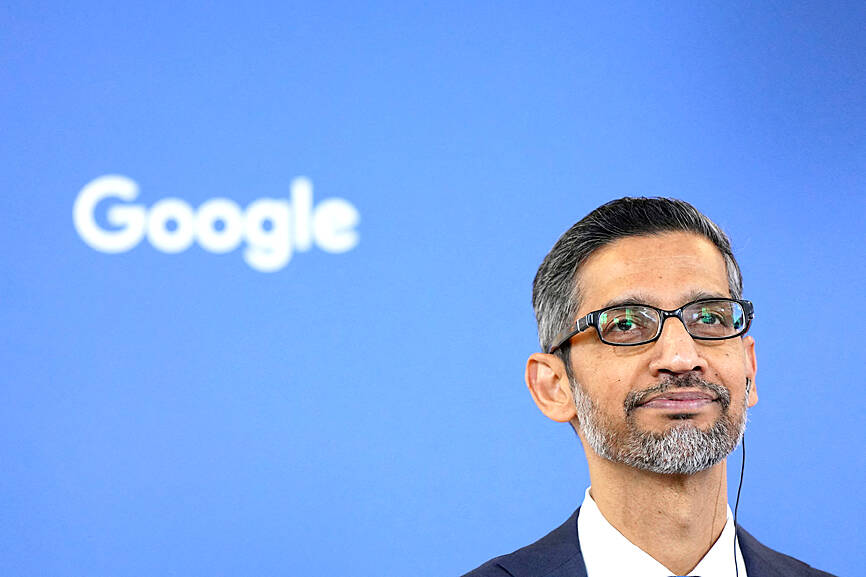The head of Google’s parent company Alphabet Inc warned that every company would be impacted if the artificial intelligence (AI) bubble were to burst, in an interview to the BBC.
Sundai Pichai acknowledged there was “irrationality” behind the boom in AI investment, which has fueled a tech rally this year.
But fears that the AI bubble could burst have led to a selloff, sending global stock markets tumbling in recent months.

Photo: Aleksandra Szmigiel, Reuters
Asked if Google would be impacted by the AI bubble bursting, Pichai told the BBC: “I think no company is going to be immune, including us.”
The interview, published yesterday, covered long-standing concerns surrounding AI, including energy needs, reducing climate targets, accuracy and the impact of AI on jobs.
Pichai warned of the “immense” energy requirements of AI, which accounted for 1.5 percent of global electricity consumption last year, according to the International Energy Agency.
AI’s global computing footprint could reach 200 gigawatts by 2030 — the annual equivalent of Brazil’s electric consumption — half of that in the US.
Geopolitical tensions have helped drive a tech frenzy to build massive data centers housing tens of thousands of chips requiring a phenomenal amount of electrical power and large-scale cool.
Pichai said action was needed to develop new energy sources and strengthen infrastructure.
The tech boss also acknowledged that the energy needs of Alphabet’s AI operations would delay the company’s climate goals, but insisted the company was still aiming for carbon neutrality by 2030.
AI will also have an impact on work as we know it, he said.
Pichai said it would cause “societal disruptions,” even potentially replace CEOs, and “people will have to adapt.”
He insisted those who adapt to AI “will do better.”
“It doesn’t matter if you want to be a teacher or a doctor. All those professions will be around, but the people who will do well in each of those professions are people who learn how to use these tools.”
Alphabet last month reported its first US$100 billion quarterly revenue, which it said was buoyed by its ability to capitalize on the AI boom.
The tech giant has ramped up spending to meet demand for AI infrastructure and pushed a global rollout of AI features in Google Search and the company’s Gemini AI models.

Taiwan Semiconductor Manufacturing Co (TSMC, 台積電) last week recorded an increase in the number of shareholders to the highest in almost eight months, despite its share price falling 3.38 percent from the previous week, Taiwan Stock Exchange data released on Saturday showed. As of Friday, TSMC had 1.88 million shareholders, the most since the week of April 25 and an increase of 31,870 from the previous week, the data showed. The number of shareholders jumped despite a drop of NT$50 (US$1.59), or 3.38 percent, in TSMC’s share price from a week earlier to NT$1,430, as investors took profits from their earlier gains

In a high-security Shenzhen laboratory, Chinese scientists have built what Washington has spent years trying to prevent: a prototype of a machine capable of producing the cutting-edge semiconductor chips that power artificial intelligence (AI), smartphones and weapons central to Western military dominance, Reuters has learned. Completed early this year and undergoing testing, the prototype fills nearly an entire factory floor. It was built by a team of former engineers from Dutch semiconductor giant ASML who reverse-engineered the company’s extreme ultraviolet lithography (EUV) machines, according to two people with knowledge of the project. EUV machines sit at the heart of a technological Cold

AI TALENT: No financial details were released about the deal, in which top Groq executives, including its CEO, would join Nvidia to help advance the technology Nvidia Corp has agreed to a licensing deal with artificial intelligence (AI) start-up Groq, furthering its investments in companies connected to the AI boom and gaining the right to add a new type of technology to its products. The world’s largest publicly traded company has paid for the right to use Groq’s technology and is to integrate its chip design into future products. Some of the start-up’s executives are leaving to join Nvidia to help with that effort, the companies said. Groq would continue as an independent company with a new chief executive, it said on Wednesday in a post on its Web

CHINA RIVAL: The chips are positioned to compete with Nvidia’s Hopper and Blackwell products and would enable clusters connecting more than 100,000 chips Moore Threads Technology Co (摩爾線程) introduced a new generation of chips aimed at reducing artificial intelligence (AI) developers’ dependence on Nvidia Corp’s hardware, just weeks after pulling off one of the most successful Chinese initial public offerings (IPOs) in years. “These products will significantly enhance world-class computing speed and capabilities that all developers aspire to,” Moore Threads CEO Zhang Jianzhong (張建中), a former Nvidia executive, said on Saturday at a company event in Beijing. “We hope they can meet the needs of more developers in China so that you no longer need to wait for advanced foreign products.” Chinese chipmakers are in